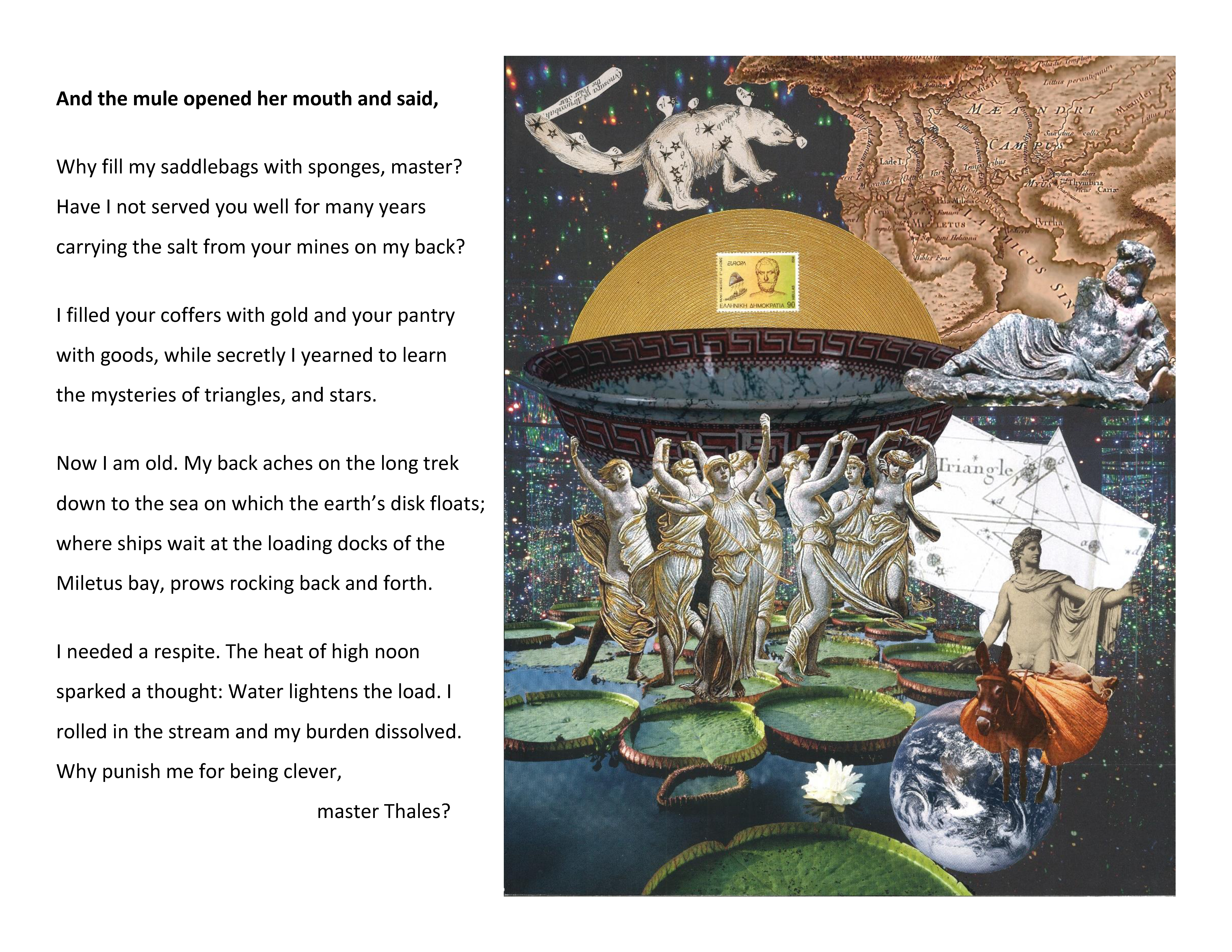A Poem-Collage Project
Poem by Sarah Glaz with Collage by Mark Sanders
The poem-collage pair appears in the JMM 2024 online art gallery: https://gallery.bridgesmathart.org/exhibitions/2024-joint-mathematics-meetings/sarah-glaz-mark-sanders
 |
 |
History, Mathematics, Poem, Collage
Thales
(ca. 622 - 547 BCE) lived in the city of Miletus, a
flourishing Greek colony in the province of Ionia (now
Anatolia, Turkey). He is considered one of the "Seven Sages"
of Greek antiquity, and the father of demonstrative
mathematics.
Thales
left no written works behind him. Revered by his
contemporaries and intellectual descendants, his life and work
became the subject of numerous accounts, some of which
contradict each other, and none of which is reliable with
absolute certainty by contemporary standards. Nevertheless,
they all credit Thales with being the first Greek philosopher
to put science on a logical basis. This includes introducing
deductive reasoning as an approach to mathematics: the why
of a mathematical truth becoming as important as the how,
which is the cornerstone of the discipline to these days. With
this, Thales opened the door to inquiries into abstract
mathematical ideas for their own sake, rather than only for
practical purposes or religious practices as it had been the
custom in other cultures before his times.
Thales
was born to a distinguished family in Miletus. In his youth,
he was a successful merchant, traveling widely throughout the
Mediterranean region and bringing home with him both goods and
scientific knowledge. Stories about his merchant days show him
as a shrewd businessman, but not a particularly kind person.
The story recounted in the poem, is a fable written by Aesop
(ca. 620 - 564 BCE) about one of Thales' mules. The mule,
loaded with salt for trade, stumbled into a stream and
discovered that rolling in water dissolved some of the salt
lightening its burden. The mule repeated the trick on
subsequent trips. To discourage this habit, Thales filled the
mule's saddlebags with sponges instead of salt. The sad mule
looks at us from the bottom right corner of the collage.
Historical
sources
describe Thales' mathematical accomplishments in the areas of
geometry and astronomy, claiming that he brought home geometry
from Egypt, and astronomy from Babylon. In the process, he
discovered new propositions and supplemented existing
knowledge with deeper understanding of underlying principles.
He is credited with five propositions in geometry, most of
which involve triangles. Stories abound about his use of these
propositions to impress kings and kin alike with calculations
of the height of pyramids and the distance of ships to shore.
One
of Thales' accomplishments in astronomy is said to be the
prediction of the solar eclipse of 585 BCE. This fact is
reflected in the collage by the golden arc emerging from
behind the Greek-motif bowl, top left. He is also said to have
discovered the usefulness of the Ursa Minor constellation to
sea navigation. The Little Bear is included in the top
left corner of the collage. Among his other contributions,
Thales is said to have observed and calculated the position of
the Pleiades star cluster. The Pleiades, also known as The
Seven Sisters, are shown in the center of the collage in
their nymph form (a detail from the 1885 paining by the
American symbolist painter, Elihu Vedder).
Thales believed that water constitutes the principle of all things, and that the Earth was a flat disk which floated on an infinite sea. The image of the Earth's disk floating on the sea, appearing in the third stanza of the poem, is reflected in the collage by the waterlily pads on top of which The Seven Sisters gracefully dance. For more details see Mark's Dissecting Thales.
Not
far from the coast of Miletus, lies the Greek island of Samos,
where Pythagoras was born and spent his early years. Some
sources claim that Thales was Pythagoras' teacher, recognizing
the talents of his pupil and passing along his knowledge and
approach to mathematics.
Many thanks to Claudine
Burns Smith and to Robert Fathauer for
help with formatting the poem-collage pair to the Joint
Mathematical Meetings 2024 Art Exhibit specifications.
